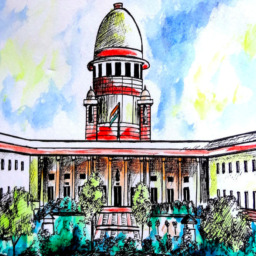Introduction
The constitution of India guarantees to all its citizens’ many fundamental rights out of those most important is freedom of speech and expression. This freedom is guaranteed by Article 19(1)(a). According to this provision, every person is free to express his opinion in any manner whatsoever. However, this freedom is not absolute and reasonable restrictions can be imposed by the state in accordance with clause 2 of article 19. According to clause 2 of article 19 reasonable restrictions can be imposed on freedom of speech and expression in the interests of the sovereignty and integrity of India, the security of the State, friendly relations with foreign States, public order, decency or morality or in relation to contempt of court, defamation or incitement to an offence.
Freedom of Press
Freedom of Press is a wide expression which includes within its fold the freedom of print and electronic media to print and publish any information which they want and also the freedom of common people to express their opinion and views in a newspaper or any other form of media.
The American Press Commission has said,
“Freedom of the press is essential to political liberty. When men cannot freely convey their thoughts to one another no freedom is secured, where freedom of expression exists the beginning of a free society and means for every retention of liberty are already present. Free-expression is, therefore, unique among liberties.”
The Indian Press Commission has also expressed a similar view. It says that
“Democracy can thrive not only under the vigilant eye of its Legislature but also under the care and guidance of public opinion and the press is par excellence, the vehicle through which opinion can become articulate.”
Facts of THE Case
Bennett Coleman & co. v. Union of India: The petitioners are media conglomerates involved in newspaper publishing. the petitioners were media conglomerates who were aggrieved by the Import Control Order 1955’s that imposed restrictions on the import of newsprint, as well as the Newsprint Order 1962’s regulations under which they have to print only such no pages and use such newsprint as are authorised by the controller. Furthermore, the newsprint Policy for 1972-73 was also challenged with these two orders which imposed further restrictions on freedom of printing and publishing newspapers. According to this policy following restrictions were imposed which are as follows:
- of pages were fixed to ten;
- If the establishment is publishing two newspapers out of which one is a daily newspaper then such establishment cannot publish a new newspaper;
- An increase in the number of pages for newspapers under ten pages may not be more than 20%; and
- No newsprint interchangeability may be permitted between different newspapers.
The respondent, on the other hand, denied the contention petitioners on the ground that fundamental rights provided by the constitution are available only to a natural person not to an artificial person i.e. companies. They further argued any challenge based on fundamental rights was forbidden by Article 358 which provides for suspension of freedom guaranteed under article 19.
The respondent favoured the subject matter test rather than effect should wherein validity of restriction should be decided on basis of what it wants to restrict even though in its effect it may incidentally encroach upon freedom, so, they argued that by these orders and policies they want to prevent monopolies even though in its effect it encroaches upon freedom of speech and expression of petitioners. Finally, they claimed that the decision on whether or not to increase newsprint imports was a policy decision that could not be challenged on any grounds other than “mala fide.”
Issues
- The issues in the case are stated below
- Is it possible for the petitioners, who are corporations, to assert basic rights?
- Whether 358 of the Constitution barred the petitioners from challenging violations of basic rights?
- Is the 1955 Order’s restriction on newsprint imports a violation of 19(1)(a) of the Constitution?
- Whether the newsprint policy was legal and met the requirements of section 5(1) of the Import Control Order 1955.
- Whether clauses 3 and 3A of clause 3 of the 1962 Newsprint Order were in violation of the Constitution’s 19(1)(a) and 14?
- Whether Remarks V, VII(a), VII(c), VIII, and X of the Newsprint Policy for 1972-73 were in violation of the Constitution’s 19(1)(a) and 14 because of the following unacceptable aspects
Judgment
The court’s opinion was given by Justice Ray. The Supreme Court stated that the petitions were maintainable as a preliminary question and the fact that the petitioners were corporations did not prevent the court from awarding remedies for violation of their rights. Furthermore, because Article 358’s prohibition did not apply to legislation adopted before an emergency, the newsprint policy could be disputed as a continuation of the previous year’s, and applicable orders may be challenged. The Court ruled that the imposition of a page limit will not only deprive petitioners of their financial sustainability, but it will also stifle freedom of expression by forcing a reduction in page count, which will reduce circulation and the area covered by news and views.
Analysis
The Supreme Court of India agreed with petitioners that certain limits and controls on media harmed the right to freedom of expression and speech. The petitioners challenged the Import Order 1955’s restrictions on newsprint imports, the Newsprint Order 1962’s regulation of newsprint sale, acquisition, and use, and the Newsprint Policy of 1972-73’s direct management of newspaper size and circulation. The Newsprint Policy was declared to be unlawful because its quantitative limits were not justified by a shortage of newsprint; nonetheless, the Newsprint Order and Import Control Order were not set down.
Conclusion
Thus, the freedom of the press, which is part of freedom of speech and expression, is a cherished right of a democratic country. It is essential to safeguard the public interests and control the administrative public persons and institutions. If guarded by the vigilant eyes of the press, they will behave properly and objectively. Thus, the media’s primary function is to educate the masses and create awareness about events and developments, which will best be served if the press acts impartially, accurately, objectively, and without bias.
Author(s) Name: Mohit Sharma (Vidyasthali Law College, Jaipur)














